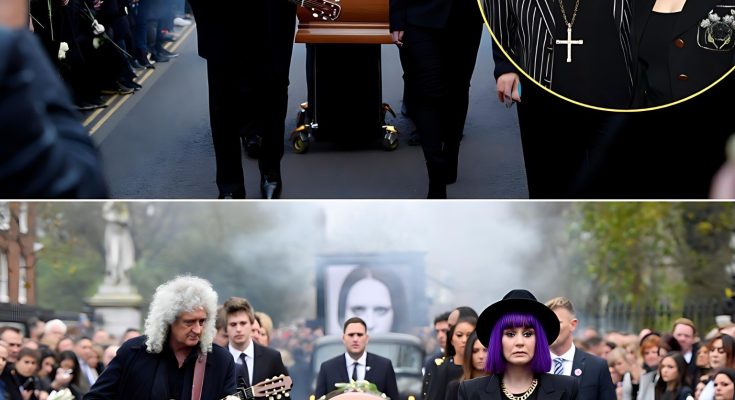This morning, July 26, at the foggy Highgate Cemetery in London, the moment of Ozzy Osbourne’s memorial became something no one could forget.
Brian May Leads Final Goodbye to Ozzy Osbourne, Strumming ‘Mama, I’m Coming Home’ as the Casket Passes Through Highgate Cemetery
London, July 25 — On a misty morning at Highgate Cemetery, a farewell unfolded that those in attendance will never forget.
Ozzy Osbourne, the immortal icon of rock and roll, was laid to rest — and it was none other than Brian May, legendary guitarist of Queen, who led the quiet procession that would etch itself into the hearts of hundreds gathered.

There were no announcements. No formal introduction. Just minutes before Ozzy’s casket was to reach its final resting place, Brian May appeared in silence, clad in a long black coat, his silver hair falling gently to his shoulders. In his hands: a worn acoustic guitar, weathered with time and history.
Then, without a word, he began to walk — slowly, beside the casket — gently strumming the opening notes of “Mama, I’m Coming Home.” And in that moment, the world stood still.

Lining the path on both sides, mourners dressed in black held white flowers close to their chests. Some wept quietly. Others knelt, hands pressed to their hearts. A few reached out as the casket passed, as if hoping to touch, just once more, the spirit of the man who gave them voice through darkness.
Walking beside the casket was Ozzy’s daughter, a young woman with striking purple hair in a short cut — her expression pale, grief-stricken. She spoke no words. Her hand rested gently on the lid of her father’s coffin, every step a silent tribute. Her tears fell without sound, but they echoed in the eyes of everyone who witnessed them.
One attendee whispered afterward:
“When Brian reached the chorus, I couldn’t hold it together. It felt like Ozzy was still with us, somewhere in that fog.”
Under the gray London sky, there was no microphone, no spotlight, no fanfare — and yet it may have been the most powerful performance of Brian May’s life.
Ozzy Osbourne, the man who once screamed “I am Iron Man” across stages worldwide, was sent home with the very melody he once wrote about returning to family. And the man who played it for him — could not have been more fitting.
This morning, July 25, in the misty fog of Highgate Cemetery in London, a scene unfolded that would be etched into the memories of all who witnessed it. It was a moment of both heartbreak and beauty—a moment where the rebellious spirit of Ozzy Osbourne, the Prince of Darkness, was laid to rest, and the world stopped to honor him.

As the mourners gathered under a grey sky, silent and heavy with grief, an unexpected figure appeared. Brian May, the legendary guitarist of Queen, stood alone in the cold morning air. His long black coat billowed in the fog, and his silver hair cascaded over his shoulders, giving him the appearance of a figure from a distant memory. In his hands, he held an old wooden guitar—weathered with time and echoing with the sounds of decades of unforgettable performances. This was not just a musician arriving at a funeral; this was a moment that transcended the ordinary, a tribute from one legendary rock star to another.
As the crowd fell into hushed silence, Brian May walked toward the gathered mourners, the weight of the moment pressing down on all who were there. The mourners lined the road, dressed in black, holding branches of white flowers that contrasted sharply against the bleakness of the day. Some stood with bowed heads, others silently wept, and still others knelt, placing their hands over their hearts as Ozzy’s coffin began its slow procession toward its final resting place.
Then, Brian May lifted his guitar, and without a word, began to play. The first notes of “Mama, I’m Coming Home” filled the air. The haunting melody, so deeply tied to Ozzy’s career, seemed to freeze time itself. The sound of the guitar echoed through the cemetery, and in that moment, it felt as though the world held its breath. For those who had followed Ozzy’s career through its highs and lows, this song was a poignant reminder of the man who had once been larger than life, but who was now leaving behind a legacy that would endure forever.

The mourners were visibly moved, many wiping away tears as they listened to the music that had shaped an era of rock ‘n’ roll. It wasn’t just the song—it was the weight of the moment. The rebellious spirit of Ozzy Osbourne, the man who had defied every convention, every expectation, was being honored in a way that few could have imagined. And as Brian May’s fingers strummed the strings of his guitar, it became clear that this was not just a memorial. This was a celebration of Ozzy’s life, his music, and the impact he had on generations of fans and musicians.
On both sides of the road, hundreds of people stood in silent reverence, their faces obscured by the fog. Some cried silently, the pain of losing such an iconic figure too much to bear. Others remained still, their hands pressed against their hearts as the coffin passed by. The air was thick with emotion, as though the very earth beneath them was mourning the loss of a man who had made it his mission to live as boldly and loudly as possible.
And then, standing beside the coffin, was Ozzy’s daughter—her grief as palpable as the fog that surrounded them. A young woman with short purple hair, her appearance a tribute to the rebellious spirit she had inherited, she stood motionless, her face pale with sorrow. Not a word escaped her lips; she simply placed her hand gently on the coffin lid, never letting go as it made its way to its resting place. The pain on her face was evident, the weight of her loss heavy in every step she took beside her father. Her tears fell silently, a quiet tribute to the man she had lost. But for all the stillness around her, her grief was contagious. The mourners around her couldn’t help but feel the depth of her sorrow, and soon, the tears of those nearby joined hers, turning the scene into one of profound sadness and shared humanity.
There was something undeniably moving about the sight of a daughter grieving the loss of her father, but there was also something incredibly powerful about the way she held herself together in such a moment of devastation. She was, after all, a reflection of Ozzy himself—the rock ‘n’ roll icon whose life had been one of fearless defiance. And in that moment, as her tears fell silently, her presence became a testament to the enduring power of family, love, and the music that had defined an era.
A Rebel’s Goodbye

As the coffin was lowered into the ground, the fog lifted ever so slightly, as though the heavens themselves were acknowledging the final farewell. The mourners stood in silence, some still clutching their flowers, others with heads bowed in quiet reflection. Brian May’s guitar gently faded into the distance, but the impact of the song remained.
Ozzy Osbourne had lived a life that no one could truly predict—a life full of contradictions, chaos, and creative brilliance. He had pushed boundaries in ways that few dared to do, and in doing so, had carved out a place in rock ‘n’ roll history that would never be forgotten. His music, his voice, and his rebellious spirit would continue to live on in the hearts of his fans, in the words of his songs, and in the lives of those who had loved him.
And as the last echoes of “Mama, I’m Coming Home” faded away, it was clear that Ozzy Osbourne’s memory would never truly fade. Not in the fog of Highgate Cemetery, not in the strums of Brian May’s guitar, and not in the hearts of the millions of fans who had shared in his journey. Ozzy was gone, but his spirit—rebellious, untamed, and unrelenting—would live on forever.






